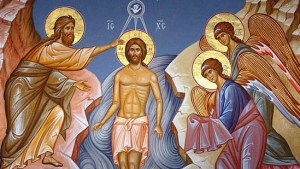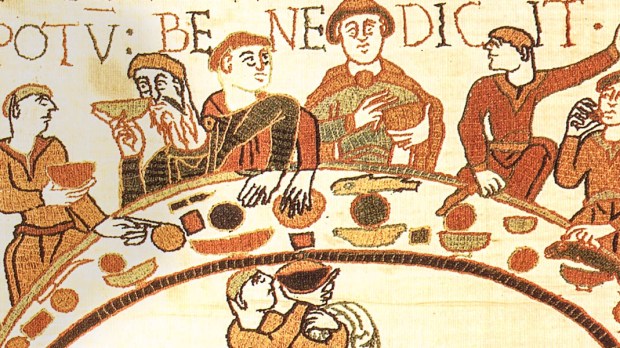“Cooking is not a chore, it is a joy. Dining is not a fuel stop, it is recreation.” With this comment, Julia Child, the famed television chef, clarifies the human experience of food.
There is a difference between eating and dining. All animals eat, but only humans dine. The preparing and sharing of a meal engages the whole person: mind, heart, and body. The mind is stimulated through planning the recipe and table conversation. A true dinner is empty without guests to share it, thus love of neighbor motivates the whole enterprise. Lastly, the nutrients of the food fortify the body. A well-executed meal can be a source of real human happiness.
The 28th Sunday of Ordinary Time highlights the vivifying nature of a beautiful meal. The Scriptures describe the food in great detail. Isaiah promises that the Lord’s table contains “rich food and pure, choice wines” (Is 25:6). Jesus’ parable stresses that in preparation for the king’s banquet, the “calves and fattened cattle are killed, and everything is ready” (Matt 22:4).
The parable calls to mind a favorite film of Pope Francis: Babette’s Feast. In the film a French housekeeper wins a lottery, but rather than return to her Parisian home, she uses the money to provide a colorful feast for members of the local community. Here’s the catch: the inhabitants of the Protestant Danish town are fearful her feast will lead them to sin. They plan on boycotting her delicious food.
Read more:
I’m passionate about cinema, says pope
The film succeeds because of its tender portrayal of the change of heart of the guests at Babette’s feast. Pope Francis notes, “She manages to make everyone feel and see human beauty. She manages to make them perceive this divine pleasure that has been wrongly suppressed for too long.”
In the Gospel, we hear of guests unwilling to attend the feast. Unlike Babette’s guests, who eventually turn to embrace the feast, there are many guests in this Sunday’s Gospel who never find themselves at table. They even, we are told, turn away. “Some ignored the invitation and went away, one to his farm, another to his business” (Mt. 22:5).
With such a beautiful preparation, why did the guests refuse the king’s invitation to the banquet? It seems as if they thought of the banquet only as a chore and a fuel stop. They focused only on their bodily needs — “one to his farm, another to his business” (Matt 22:5). They misunderstood that the king would “fully supply whatever you need:” mind, heart, and body (cf. Phil 4:19).
Every Christian must examine her heart and ask: What are the “farms” or “businesses” to which I turn? What are the things that I allow to occupy my attention rather than devoting myself to the banquet of heaven? Do I always make time for Sunday Mass? Do I pray everyday? Do I put work before family life? Am I more intent on becoming a saint than being successful in this life?
The king’s reaction to being slighted may seem harsh in the parable. And yet, is it not exactly what will come? Nothing on this side of eternity will last. We will, all of us, face death. We will find ourselves before the judgment seat of Christ accounting for the times when we have preferred farms and businesses to the feast of the Lord. And in the end, that is on the Last Day, everything under heaven will be destroyed.
We should not doubt, friends, in the ability of the Lord to provide for our needs. As St. Paul attests, “My God will fully supply whatever you need, in accord with his glorious riches in Christ Jesus” (Phil. 4:19).

Read more:
Here are the 12 “Great Feasts” that Eastern Christians celebrate each year
The Lord God provides us a banquet that supplies not only for our physical needs, but our spiritual needs as well. He prepares the feast with love, and invites us to dwell with him at the table. The feast will be a tremendous occasion of joy! Pope Francis says,
The most intense joys in life arise when we are able to elicit joy in others, as a foretaste of heaven. We can think of the lovely scene in the film Babette’s Feast, when the generous cook receives a grateful hug and praise: ‘Ah, how you will delight the angels!’ It is a joy and a great consolation to bring delight to others, to see them enjoying themselves. This joy, the fruit of fraternal love, is not that of the vain and self-centered, but of lovers who delight in the good of those whom they love, who give freely to them and thus bear good fruit. (Amoris Laetitiae, 129)
The feast of the Lord is all the more joyful because of what is being celebrated. The Lord has wed himself to us. The wedding banquet of Christ is the Word-made-flesh coming as bridegroom for the Church. The Church, the body of believers, men and women of every race and nation, are now gathered into one in Christ Jesus the Lord. What a feast!
The unfortunate reality is that we often approach Mass as just another “chore” or even a sacramental “fuel stop.” Let us always remember that the Eucharist is so much more. The feast of the Lord is a re-creative and life-giving banquet at which Christ himself is both the host and the food.

Read more:
Why early Christians prayed before and after meals

